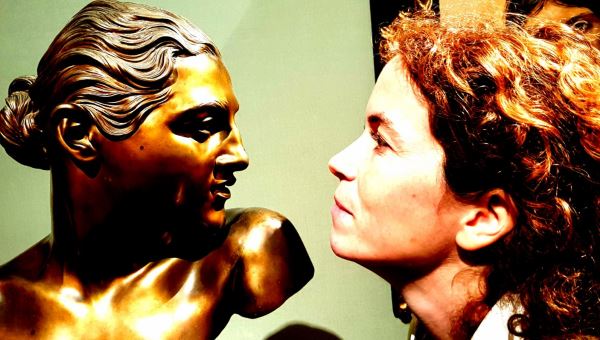Professor Eszter Salgò on the Sacralization of Politics in India
Professor Eszter Salgò recently delivered a paper at the conference dedicated to studying the link between aesthetics and politics at the École Normale Supérieure in Paris.
The conference “Modes of Authority and Aesthetic Practices from South to South East Asia” was jointly conducted by four French research units from Université Paris Sciences et Lettres (PSL) –– the Centre Asie du Sud-Est (CASE), the Centre d’Etudes de l’Inde et de l’Asie du Sud (CEIAS), the Laboratoire d’Anthropologie Sociale (LAS) and the Groupe Sociétés Religions Laïcités (GSRL). The goal of this international and interdisciplinary conference was to think comparatively about the relationship between aesthetic phenomena and authority in South and Southeast Asia (a part of the world where the aesthetic dimension plays a particularly important role in the legitimation of different types of authority).
Prof. Salgò presented a case study on the sacralization of politics in today’s India. Her paper – “Narendra Modi’s Sacred Gaze: The Role of Visuals in the Communications Strategy of India’s Prime Minister,” explores the prime minister’s endeavors to portray himself in various visual materials as the savior of the country and the harbinger of a new era, in order to strengthen citizens’ loyalty to and religious reverence for his political establishment, thereby consolidating his legitimacy. Using insights from anthropology, social science, cultural theory and art theory, Prof. Salgò drew on David Morgan’s concept of the “sacred gaze” and on what Fabio Fabietti describes as “visual piety” to study the way Narendra Modi seeks to replicate the dynamics that occur in the interactions between deities and their human worshippers and to “darshan” a new nation. Her main argument is that social networks, in particular Instagram (where we can observe the triumph of images of high aesthetic value) offers great opportunities for the deification of India’s prime minister, the public demonstration of dependence and adulation, the leader’s expression of praise for his devotees, in a nutshell, for the creation of what Arjun Appadurai calls a “community of sentiment.”
A lecturer in the Department of Political Science and International Affairs, Dr. Salgó holds a B.A. and an M.A. from Corvinus University in Budapest, and a Ph.D. from the University of Rome “La Sapienza.” In her research, she explores how both conscious and non-conscious emotive experiences relate to public and political life. She studies the many ways desire, fantasy, and emotions figure in the realm of politics, with special emphasis on periods of tension and conflict.
In Fall 2018 Professor Salgò will be teaching PL 209 World Politics, PL 212 International Organizations, and PL 399 Special Topics in Political Science: Politics and Psychology.
Learn about studying Political Science and International Affairs in Rome.






